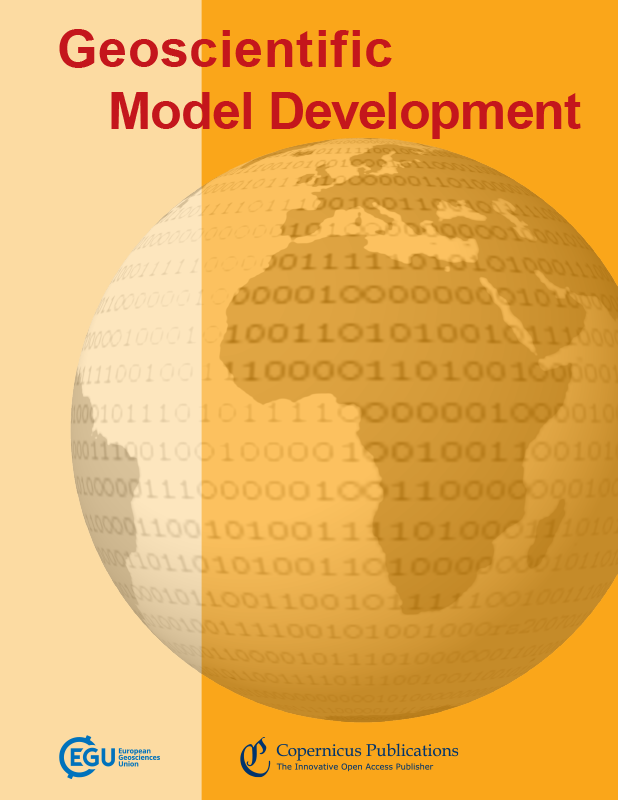基于在线生物地球化学的高分辨率海洋汞模型MITgcm-ECCO2-Hg
IF 4.9
3区 地球科学
Q1 GEOSCIENCES, MULTIDISCIPLINARY
引用次数: 0
摘要
摘要汞是一种全球性的持久性污染物。模拟研究是综合当前对汞循环理解的有用手段。以往的研究主要采用粗分辨率模型,无法分析湍流在Hg循环中的作用,对动能输运的描述也不准确。此外,它们都与离线生物地球化学耦合,因此它们不能响应海洋汞浓度的短期变化。在我们的方法中,我们利用高分辨率海洋模型(MITgcm-ECCO2,称为“高分辨率- mitgcm”)与达尔文项目(称为“在线”)的生物地球化学过程的并行模拟相结合。这种整合使我们能够全面模拟汞的全球生物地球化学循环,水平分辨率为1/5°。对河口和沿海地区、强西部边界流和上升流地区以及以旋涡形式的浓度扩散的地表汞浓度的更精细描绘表明,湍流的影响在以前的模型中被忽略了。在我们的模拟中,藻华等生态事件可以引起浮游植物生物量和叶绿素浓度的突然增加,这也可以同时导致颗粒结合汞(HgaqP)下沉通量的急剧变化。在全球河口地区,在高分辨率模型中包括河流汞输入,可以揭示汞在精细尺度洋流驱动下的涡旋向外扩散。在更快的流速和扩散速率下,我们的模型更准确和详细地捕捉了河流排放中汞的运输和混合,提高了我们对海洋中汞循环的理解。本文章由计算机程序翻译,如有差异,请以英文原文为准。
A high-resolution marine mercury model MITgcm-ECCO2-Hg with online biogeochemistry
Abstract. Mercury (Hg) is a global persistent contaminant. Modeling studies are useful means of synthesizing a current understanding of the Hg cycle. Previous studies mainly use coarse-resolution models, which makes it impossible to analyze the role of turbulence in the Hg cycle and inaccurately describes the transport of kinetic energy. Furthermore, all of them are coupled with offline biogeochemistry, and therefore they cannot respond to short-term variability in oceanic Hg concentration. In our approach, we utilize a high-resolution ocean model (MITgcm-ECCO2, referred to as “high-resolution-MITgcm”) coupled with the concurrent simulation of biogeochemistry processes from the Darwin Project (referred to as “online”). This integration enables us to comprehensively simulate the global biogeochemical cycle of Hg with a horizontal resolution of 1/5∘. The finer portrayal of surface Hg concentrations in estuarine and coastal areas, strong western boundary flow and upwelling areas, and concentration diffusion as vortex shapes demonstrate the effects of turbulence that are neglected in previous models. Ecological events such as algal blooms can cause a sudden enhancement of phytoplankton biomass and chlorophyll concentrations, which can also result in a dramatic change in particle-bound Hg (HgaqP) sinking flux simultaneously in our simulation. In the global estuary region, including riverine Hg input in the high-resolution model allows us to reveal the outward spread of Hg in an eddy shape driven by fine-scale ocean currents. With faster current velocities and diffusion rates, our model captures the transport and mixing of Hg from river discharge in a more accurate and detailed way and improves our understanding of Hg cycle in the ocean.
求助全文
通过发布文献求助,成功后即可免费获取论文全文。
去求助
来源期刊

Geoscientific Model Development
GEOSCIENCES, MULTIDISCIPLINARY-
CiteScore
8.60
自引率
9.80%
发文量
352
审稿时长
6-12 weeks
期刊介绍:
Geoscientific Model Development (GMD) is an international scientific journal dedicated to the publication and public discussion of the description, development, and evaluation of numerical models of the Earth system and its components. The following manuscript types can be considered for peer-reviewed publication:
* geoscientific model descriptions, from statistical models to box models to GCMs;
* development and technical papers, describing developments such as new parameterizations or technical aspects of running models such as the reproducibility of results;
* new methods for assessment of models, including work on developing new metrics for assessing model performance and novel ways of comparing model results with observational data;
* papers describing new standard experiments for assessing model performance or novel ways of comparing model results with observational data;
* model experiment descriptions, including experimental details and project protocols;
* full evaluations of previously published models.
 求助内容:
求助内容: 应助结果提醒方式:
应助结果提醒方式:


